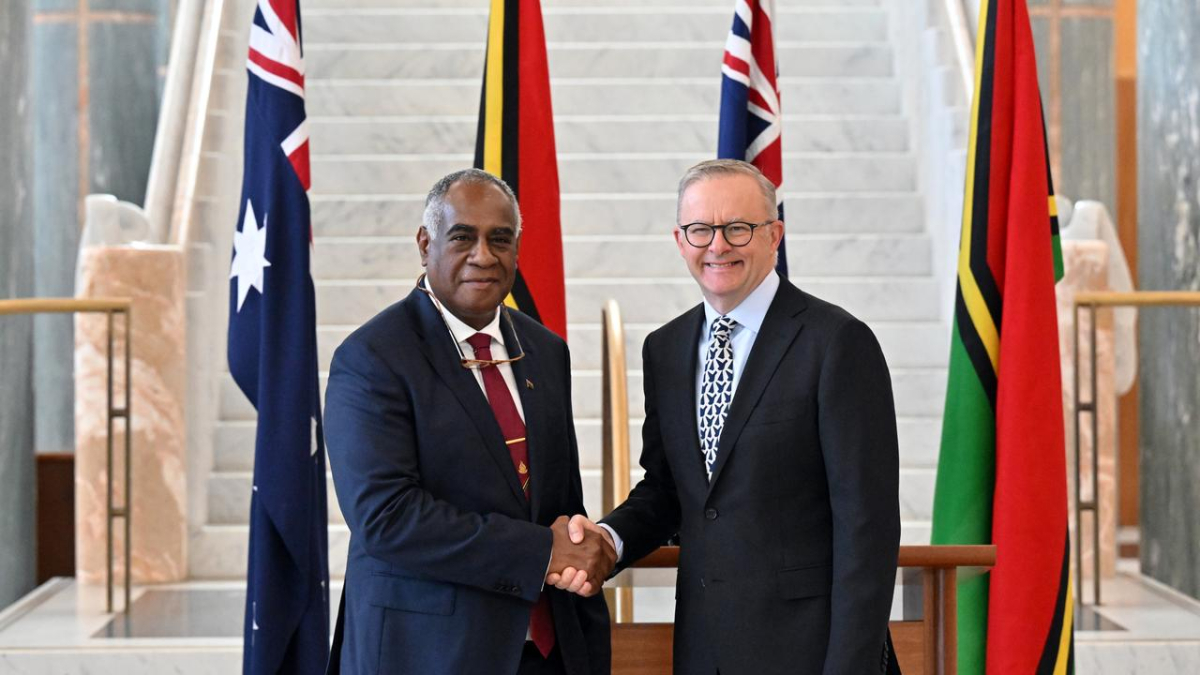A shelved security pact with Australia could be back on the table should Vanuatu change its government in the coming weeks: either at a snap poll or a no-confidence motion in the prime minister.
Both options are in play after a chaotic period in Vanuatu politics which climaxed last month when Prime Minister Charlot Salwai’s cabinet recommended to dissolve parliament half way through a four-year term.
President Nikenike Vurobaravu accepted that call, clearing the decks for a snap election, which this week was set down for 14 January.
However, a twist in the tale could be coming, with opposition MPs launching a Supreme Court bid to nullify the dissolution of parliament.
The basis to the case, which will be held on Tuesday, will be two political power-plays by opposition MPs were handled legally.
Earlier in November, the disaffected MPs, including former Prime Minister Ishmael Kalsakau, tabled a motion to remove President Vurobaravu, and then later in the month, they threatened a no-confidence motion in Salwai.
The threats prompted PM Salwai to dissolve parliament, which had the effect of sparing Vurobaravu the removal motion and took the prime minister’s own future out of the hands of parliament and into the hands of voters.
Kalsakau said the president “cannot be judge and jury of his own case”.
“We believe he suffered a massive conflict of interest, and he could not have acted,” he told AAP.
Kalsakau claimed confidence of success, either next week or on appeal.
The high-stakes manoeuvring is common in Vanuatu, which suffers from chronic political instability.
More than a dozen parties are represented in the 60-seat parliament, and just one prime minister has served a full four-year term since 2008.
Kalsakau was a beneficiary of that tumult in 2022, when a no-confidence motion brought a snap poll, and he emerged from coalition negotiations as prime minister.
Within weeks of taking office, Kalsakau signed a bilateral pact with Canberra to intensify military, policing and cyber-security co-operation.
That deal was seen a strategic win for Anthony Albanese’s government, seeking to firm up support in the region in its geopolitical contest with China.
However, the pact did not enjoy enough support in parliament to be ratified, and successors to Kalsakau – who fell to another no-confidence motion llast year – do not support it.
Now, Kalsakau insists, it could be revived.
“The parties who are supportive of the change of government are all agreed that we will pursue it as soon as we get back to government,” he said.
“We will get the ratification through.
“Australia is one of our very close partners. It’s almost a stone’s throw away.
“That agreement does not preclude Vanuatu from entering into other relationships. It’s just making sure that the Pacific and the Ocean that we don’t get tangled in the happenings … elsewhere.”
Government MP and climate envoy Ralph Regenvanu told AAP the security agreement – as currently written – was not in Vanuatu’s best interests.
“The problem with (the pact) is that it’s not our agenda. It’s an agenda being imposed by Australia, by others, by the geopolitics of the region,” he said.
“We’re trying to respond to it in the best way we can, without necessarily becoming aligned. We have a very clear non-alignment policy.”
This week, Regenvanu rebuked Australia for its stance on the Vanuatu-led International Court of Justice hearings on the legal responsibility of high-emitting nations to prevent climate change.
He said a security partnership that centred climate concerns may win broader support.
“It needs to be a partnership that’s got aspects beyond hard security, which is the aspect that Australia is most interested in,” he said.
“For us, it’s climate. Climate is much more important than armament and security.”
Last year, Australia secured a wide-ranging security pact with Tuvalu which also grants migration pathways for the climate-threatened nation.
This week, the Sydney Morning Herald has reported Australia may also land a similar deal with Nauru.














